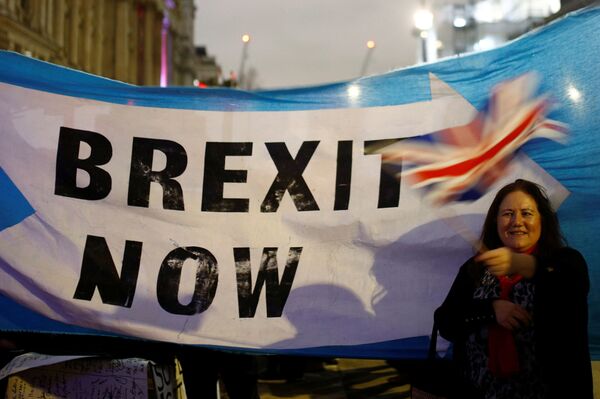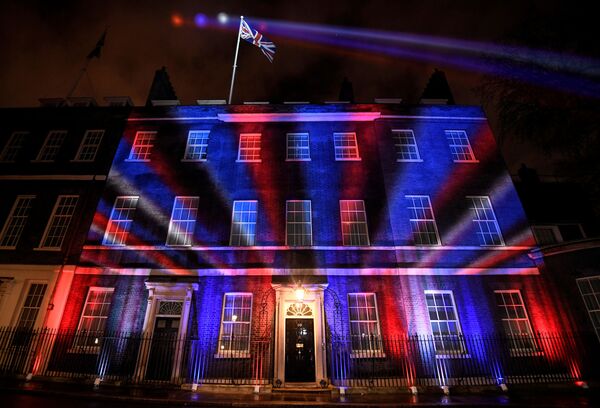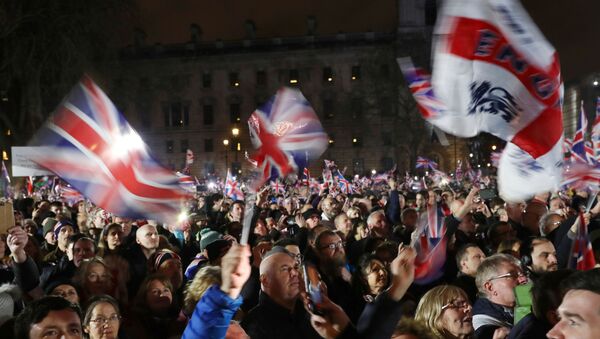Boris Johnson is expected to make a speech on Monday outlining the negotiating goals he has set up for trade talks with the EU, which are expected to begin next month, the Daily Mail reported, also suggesting he is determined to rule out the EU-proposed extension to trade deal talks beyond the end of 2020.
The prime minister will reportedly warn the EU that failure to agree upon a full-fledged deal by the end of the year would automatically bring about tariffs on many popular EU goods, with the move potentially lowering demand on them by raising prices. The Times first reported the intention to use tariffs as “leverage” early this week.
The prime minister is also expected to rule out EU calls to retain access to the UK’s fishing waters, as well as to make the European Court of Justice oversee the final trade deal.
As Downing Street said on Friday, the PM made it “clear that we are seeking a Canada-style free trade deal” in which most goods traded between the EU and UK would be duty free and which would guarantee that Britain would complete its transition as scheduled.
"It is extremely likely that UK PM Boris Johnson and his team, will insist that the terms of any trade deal be compliant with the essence of Brexit. That means NO LEVEL PLAYING FIELD and NO automatic access to UK Fishing waters. The EU is frightened of a free and economically independent UK and that is why it seeks to shackle the UK. However it is no longer Theresa May that the EU faces, it is a Conservative Government with a large majority in the House of Commons and it can do what it wants. Nobody seeks tariffs and Boris Johnson has made it clear that he wants to see a zero tariff deal with the EU", says David Vance, a political commentator and author.
He, however, points out one thing: the European Unions sells £66 billion more to the UK than London does to Brussels.
"Any tariffs imposed would devastate the EU, and [Angela[ Merkel and [Michel] Barnier know this to be the case. The EU as a whole is in the economic doldrums, with Germany on the edge of recession. There is nothing to suggest that Germany and France are likely to see their financial fortunes restored and they are the main contributors to the EU budget. The absence of the UK causes an existential financial black hole for the EU. The EU fears that a prosperous UK economy outside the Union will attract investment that would otherwise go to the EU".
What’s in a Canada-style Trade Deal?
The UK-EU free-trade agreement is proposed to be modelled on the one between the EU and Canada, inked in 2016. Such a deal will eventually remove all tariffs on goods. CETA or the Comprehensive Economic and Trade Agreement, for instance, gives European and Canadian firms access to each other's markets for government contracts.
According to Michael Gove, head of the Cabinet Office, there would be “winners and losers” in industries as a result of the looser relationship with the EU. He added though that the government would diverge in regulatory terms only where there was an obvious competitive advantage.
He also dismissed assumptions that the UK could give away fishing access in exchange for a trade deal with the EU. “We’ll make our own decisions. We’ll be an independent coastal nation - we can have a friendly relationship with other countries but we’re in control", he told Sky News.

He separately confirmed the Canada-style agreement was likely to mean the introduction of some customs and regulatory checks on exports and imports, like tariffs on such goods as German cars, French cheese, and Italian wines.
“We want trade to be as frictionless as possible", he said, adding: "but the EU is clear – you can only have fully frictionless trade if you accept all of their rules. If you accept all their laws, you are subordinate to their judges, you are subordinate to their political structures".
According to Robert Ackrill, Professor of European Economics and Policy at Nottingham Trent University, any trade agreement that puts the UK outside of the Single European Market and Customs Union will mean Britons will no longer enjoy frictionless trade. “This is because, even if we remove tariffs (taxes on imports) and quotas (quantitative limits on imports), we shall now face barriers arising from different product standards, different food safety regulations, etc", the academic explains.
He contends that a UK-EU deal cannot be like the Canadian agreement because Canada has a totally different trading relationship with the EU: for instance, roughly 10% of Canadian exports go to the EU, while with regard to the UK, the figure is about 45%, the commentator illustrates.
“Logically it [CETA] cannot be as good and fit for the UK economy as for Canada", Professor Ackrill sums up, also stating there would be severe repercussions for the services trade, which would be in no way sufficiently liberalised.
“CETA does include some liberalisation of services, but looking at what services products are NOT liberalised in CETA, adopting the CETA agreement as it stands would mean that about 70% of UK services and financial services exports to the EU would have barriers to trade imposed on them, where currently there are none", the economist points out.
Something else has recently emerged that might affect what the EU is willing to concede to the UK on services: along with large net export surplus in services with the EU27, London earlier provided European fishermen with access to UK waters.
It is now believed that the UK may use it as a concession and seek to exploit continued access to UK fisheries “as a way of getting a better deal on services than the EU has offered to anyone else in the past".
“The UK government has recently introduced post-Brexit draft fisheries legislation that would exclude EU27 fishermen from UK waters. But that can be changed", the analyst rounds off adding that whatever posturing prevents the two sides from agreeing on keynote issues, the upcoming trade-offs will ultimately be impacted “not by the economics of the situation, but by the politics".
The major point for the UK seems to be regulatory break-up, he says: as compared to Theresa May’s government, the current one is much more willing, “indeed it seems to be pursuing, regulatory divergence from the EU as a matter of principle". “Thus the factors set out above that will hit the UK economy negatively seem to be of lesser concern to the government than the commitment to regulatory divergence, seemingly as a goal in itself", Ackrill notes.
'Deadlines Can Come and Go'
Dr Donnacha O'Beachain, associate professor at the School of Law and Government, Dublin City University, in turn, suggests that people "learned very little from Boris Johnson's Brexit Day speech", and "all the big questions remain unanswered", while the "tough choices have yet to be made".
"We have no real idea how long it will take to negotiate a free trade agreement. As we know from recent experience during the Brexit process, deadlines can come and go if they are unrealistic. We don’t know what will be the core features of this agreement and therefore are a long way from fleshing out the details. The UK has continued to send conflicting signals regarding its attitude towards the trade-offs that any divergence from EU regulations will inevitably entail, particularly when it comes to accessing the single market", the professor opines.
According to O'Beachain, the European Union's priority is to make sure that there is a "level playing field in the sphere of trade", which means the UK should not be "in a position to derive a competitive advantage by undercutting EU's standards" in multiple areas such as the environment, state aid, taxation, and labour laws.

"Another major area of contention will be the mechanisms required to ensure that each side adheres to the rules and how quickly complaints can be settled. From the EU’s perspective it will be a unique agreement. Not only will the EU be negotiating with a former member state but the focus will be on adding trade barriers, rather than reducing them. The level of divergence will also have grave implications for the island of Ireland. In this context, it is interesting to note that the EU Commissioner for Trade, who will play a pivotal role in the negotiations, is Irish", O'Beauchain adds.
UK’s Priorities in a Nutshell
The post-Brexit agenda is naturally a talking point not only back home, but well beyond Britain.
As Dr James Downes, a professor of comparative politics at the Chinese University of Hong Kong, put it, the UK government will need to address "thousands of pieces of legislation that deal with policy areas spanning agriculture, fisheries, single market/economics, and many more key issues". With that, he notes, there could hardly be a way for the country to fully separate itself from the EU, in terms of economy, although it is “deeply unpopular with leading Brexiteers”.
Despite the current UK government being profoundly “Eurosceptic”, “there will need to be a 'close' relationship (economically speaking) between the EU and the UK over the next 5-10 years", the professor remarks.

Among the aspects that the UK is expected to zero in on is affordable housing, “combatting climate change policies (all of these policies have taken a backseat over the last three years or so) for dealing with income inequality, reforms to the National Health Service (NHS)", the commentator suggests. “All of these issues have been ignored post-2016 Brexit referendum vote and now need to be placed at the forefront of the UK government’s domestic policy agenda", Downes says, adding a few more issues to the crucial agenda in the “still divided” country:
“The future of the 'Union' in the UK is also up for stake, with a potential Scottish independence vote on the horizon and dissatisfaction amongst citizens in Wales and Northern Ireland", he notes.
Almost half a century of Britain’s membership in the EU formally ended at 11 p.m. on Friday, three and a half years after a referendum in which voters chose to leave the bloc (52 percent for and 48 percent against).
The clock has now started ticking on a new deadline, 31 December, the end of an agreed transition stint.




